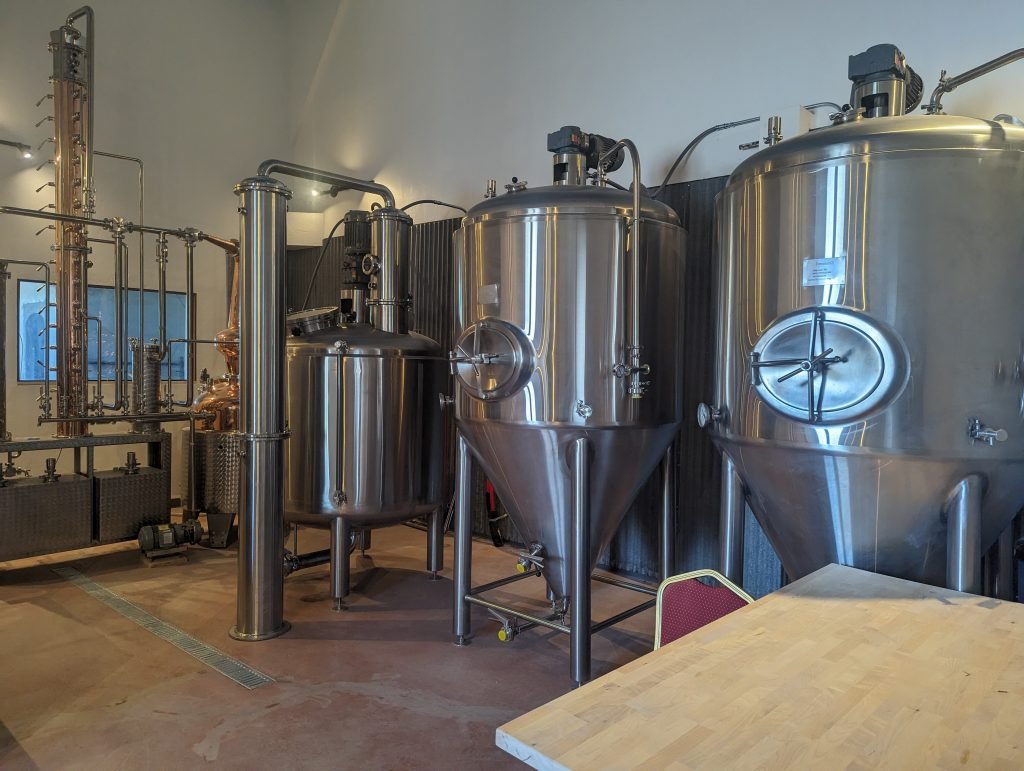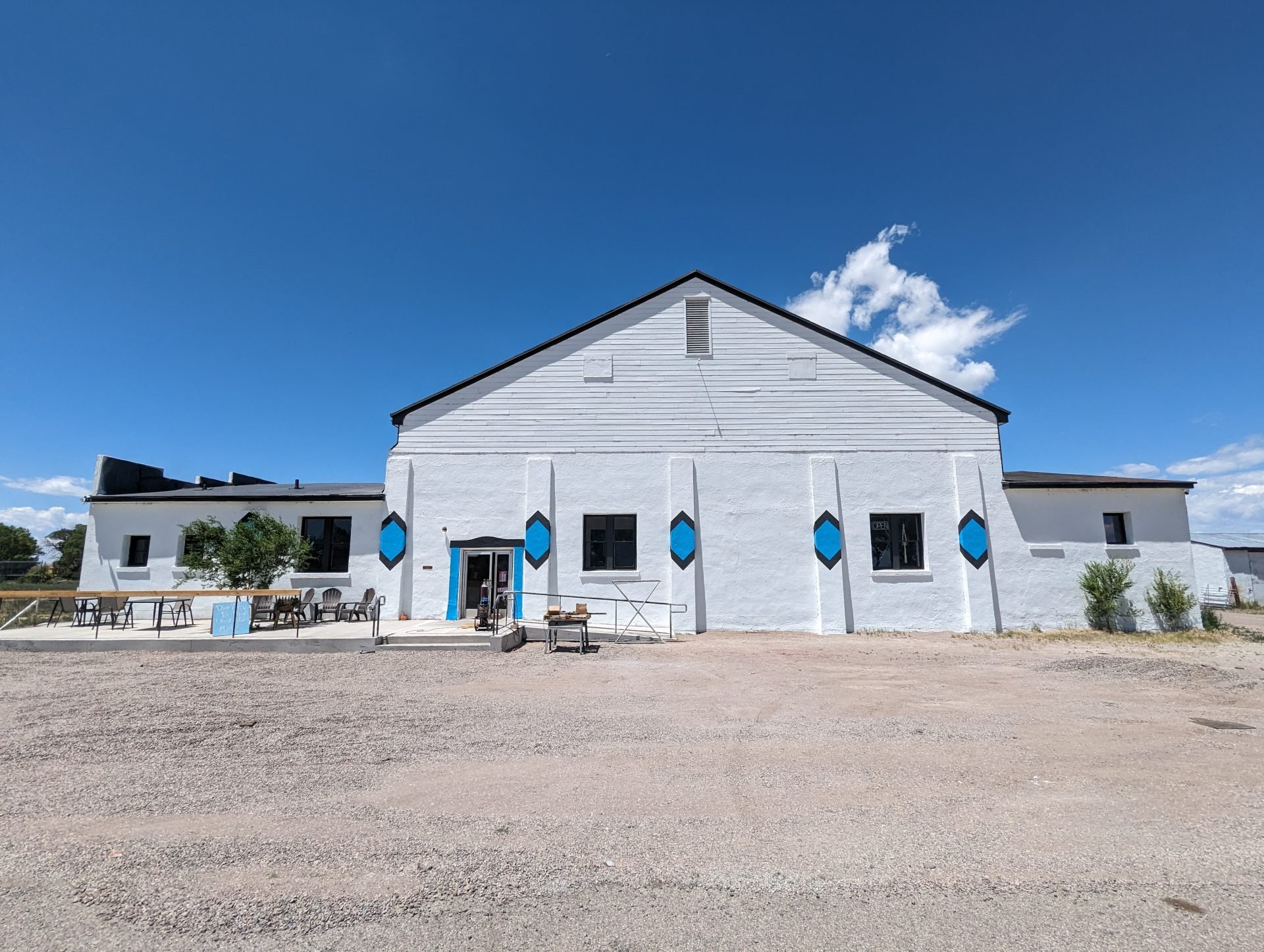By Daniel Hart.
Not far from the Great Sand Dunes National Park, a small group of highly motivated people are working quickly and efficiently, wrapping up food aggregation as the setting sun casts its sangria hue on the Sangre de Cristo Mountains.
This small group isn’t who you might think. It’s not a Paleolithic hunting party butchering a mammoth and gathering what plants they can carry for the uncertain road ahead like in times past. It’s a new generation of hunter-gatherers, known as the Valley Roots Food Hub and the Dune Valley Distillery.
While the Food Hub has been working to build and strengthen the Valley’s local food system for nearly a decade, its affiliate, the Dune Valley Distillery, just opened this spring. The distillery also hosts the Root Cellar Market, a retail outlet for the Valley Roots Food Hub. These organizations, under the direction of Nicholas Chambers, carry on the cultural heritage of the Valley and Chambers’ own family history. Three simple ideas create a unique symbiosis and guide operations at the Food Hub and distillery: history, food/agriculture, and renewable energy.
Chambers’ family has a proud tradition of alcohol production in Colorado that inspired the Dune Valley Distillery. His family’s Carbone Wine label and alcohol distributing company in Denver were the first licensed wine label and alcohol distributor in Colorado after Prohibition and became the largest liquor distributor west of the Mississippi. “I grew up with Carbone Wine, my great-grandfather’s wine label in Denver, established in 1903.
They went underground in Prohibition, and as soon as Prohibition ended, he got license number one,” explained Chambers. “It’s a label no one else can claim. We thought we should honor that and do it again, but I’m not in wine country. I’m in potato country. So, I thought we could do a mean potato product. I convinced people we should do it, and it became a passion project that just kind of snowballed.”
Three simple ideas create a unique symbiosis and guide operations at the Food Hub and distillery: history, food/agriculture, and renewable energy.
After four years of work, the Dune Valley Distillery has opened its doors in a historic building that was once the Mosca Community Hall and Gymnasium. In the heart of Mosca, this building was first built in 1934 with New Deal funds as a school gymnasium and center for community events and functions. Now renovated, the new distillery is open for business Thursday to Monday from 10 a.m.-8 p.m.

Although only potato spirits are on tap at the distillery currently, the distillery received a grant to develop quinoa spirits to complement their current offerings, which include Mosca Mule, Voodoo Vodka Tonic, Chupacabre Milk Vodka Tonic, Vodka Mojito, and Sangre de Cristo Sparkling Water. Conveniently, quinoa will be sourced from White Mountain Farm quinoa producers just a few hundred feet away from the distillery.
Valley Roots Food Hub operates next door to the distillery, the two to
gether giving a food campus vibe. The campus vibe is intentional in hopes of creating a community space where locals and visitors can feel at home. There is also something more about this campus than meets the eye. Renewable energy, including solar power, wood chip gasification, and anaerobic food waste digestion partially power the campus which can recycle food waste from the operations on campus, leaving very little waste going back into the environment. The Food Hub offers wholesale sales, a community supported agriculture (CSA) program, and an online buying program. Their foods are exclusively sourced from around Colorado and northern New Mexico. The CSA program is focused on making sustainable, healthy food available to individuals and families by offering curated weekly food boxes for 13 to 14 weeks of the summer.
The online a la carte buying option provides more individualized choices. Most of these carefully curated regional foods can now be purchased at the Roots Cellar Market retail store at the distillery.
The symbiosis of these two organizations is evident. The Food Hub is able to gain wider retail exposure by showcasing and selling their products at the distillery, and the distillery is able to source ingredients for its products from the Food Hub. Their collaboration pays big dividends to the community and economy by offering regular events and culinary delights.
A five-course dinner featuring all local food and drink can be experienced the first weekends of July, August, and September at the distillery. In addition, North, South, and West Valley farm tours of Valley Roots food sources and vendors are also offered in late July, August and September, showcasing more than a dozen San Luis Valley producers. Check the Valley Roots Food Hub website valleyrootsfoodhub.com for event and shopping details.


